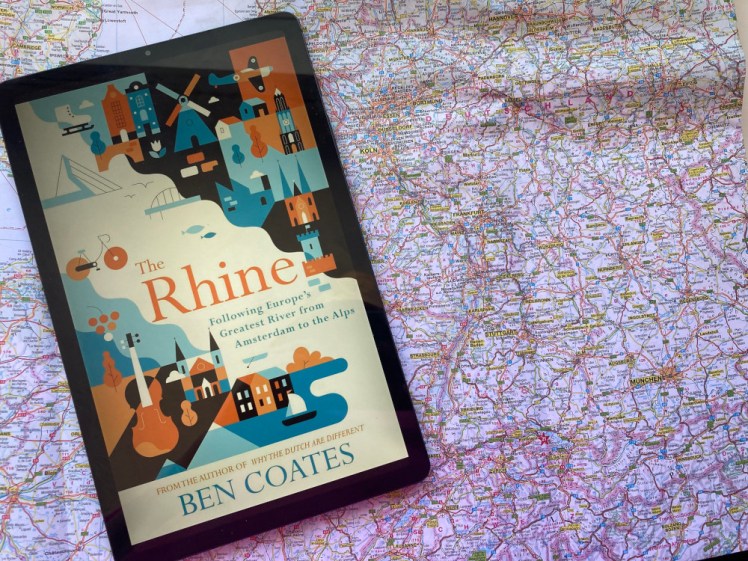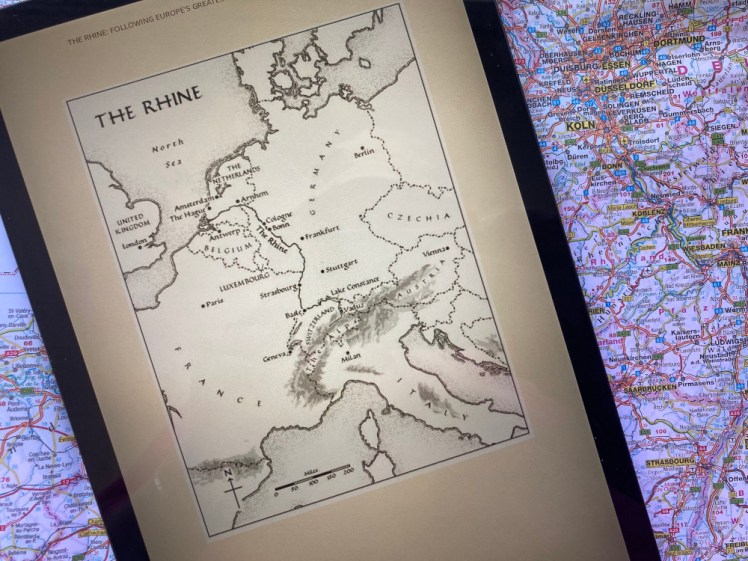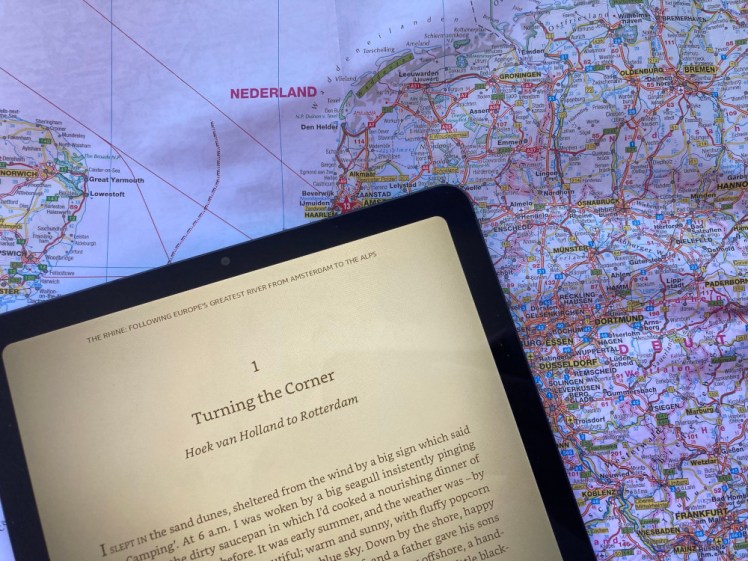Let’s give it its full title – this month’s Travel Library comes from The Rhine: Following Europe’s Greatest River from Amsterdam to the Alps by Ben Coates and let’s start by being brutally honest. This was a slog. The fact that I bought it in 2022 and never got beyond the first page until now should have been a clue that I wasn’t going to adore it but I gave it a go. I really like the premise. A book about exploring the full length of the Rhine is a great idea. I’m sure many people have travelled the length of the Rhine and found the source deep in the Swiss Alps but to expand your adventure into a book… I almost wish I’d thought of it.

Coates explores by bike, by running and taking boats along some of the more touristy stretches. Again, all good. He’s joined by “the dog” (it’s mentioned precisely once that the dog’s name is Blackie) for the Romantic Rhine chapter and for the last day or so climbing up to the source. I think I actually like the presence of the dog and wish she was there for the entire thing but the fact that she comes and goes do pretty much confirm that this wasn’t done as a single continuous journey. I’m in no position to complain about that. I’ve written two books now that claim to be single continuous journeys that absolutely were not. But you at least have to be consistent and pretend! My Iceland book is made up of adventures done by long-distance bus, small car and campervan, staying in said campervan and my tiny tent and the first and hardest decision is writing that book was which of those was the one that was going to appear in the text.
The reason I say that I wish the dog was there all the time is that although Coates talks to plenty of people on the way, you never really see those interactions. They get reported later on in the exactly the same tone he uses when he repeats quotes from guidebooks and authors and philosophers. That’s the trouble, that tone. It so often feels so dry. It sometimes feels like the trip never happened and the whole book is just paraphrasing over books to make it sound like it did happen. To clarify, I absolutely believe he did go and did see and do all this but he fills it up with so much research – like Andy Weir and The Martian. He did all the reading and all the maths and it’s all going into the book as evidence that he did it.

Now, it is interesting. I hadn’t really realised how industrial the Rhine is. I knew rivers were used for industrial transport and that’s part of the reason so many major cities are on big rivers in the first place and I know there are river cruises up and down the Rhine and the Danube but I wasn’t expecting the scale of the ports and the container ships and how it stretches all the way from the North Sea to Basel. It’s also a bit like watching Michael Portillo and his train programmes – in the same way that “tell me about this place” always comes back to “Ah, this place is all about the railway coming!”, everything in this book comes back to “it’s because of the Rhine!”. I suppose I should expect it. It’s literally a book about the role and importance of the Rhine. Why is there industry here? The Rhine. Why are there castles here? The Rhine. Why are there tourists here? The Rhine. Why this? The Rhine. Why that? The Rhine. You do start to realise how many roles a river can serve, how many different ways it can influence and shape the land around it – as a trade corridor, as a water source, as a moat, as a border, as an obstacle, as a thing of beauty and so on.
Once we get into Basel, it all gets a bit quieter. The Rhine doesn’t do a lot as it weaves along northern Switzerland and down the borders between Switzerland, Austria and Lichtenstein – does make me want to spend a couple of days in Lichtenstein, though. I’ve only ever passed through it without even stopping for a picnic. But something odd happens in the Schaffhausen chapter. To be clear, Schaffhausen is in north-east Switzerland. Essentially, it’s surrounded by Germany on three sides, which is how it came to be accidentally bombed in WWII. But you get this line: “Heading east from Schaffhausen, the French border was only a few dozen miles away, but the French influence seemed limited.” Yes. That’s because France is at the opposite end of the country. Ok, it’s less than fifty miles away because Switzerland is an odd meeting place of various borders but of course there’s no French influence. You’re deeply and thoroughly in the German regions of Switzerland. I wouldn’t expect French influence in Schaffhausen any more than I’d expect Scottish or Venezuelan influence. And no, people in Swiss-German cantons don’t speak French. Fair enough that you’d try one of Switzerland’s four official languages before English but my experience is that Swiss-Germans would rather speak English. I’ve tried it myself, back when I used to live in French-speaking Switzerland, on one of my many expeditions around my adopted country.
The epilogue is written and set in Berlin because the author came to find out more about the elections and… write a chapter on the rise of far-right politics in Europe. I mean, epilogue, fine. You’ve explored the whole Rhine, you’ve explored its history and its future and how it influences the people who live and work around it, it’s fair enough to write a conclusion tying it all together and reflecting on the whole thing. But this felt odd and out of place. Well, it’s in Berlin, which even Coates has to admit is about as far from the Rhine as you get within Germany. And it’s the way this depressing rise of the far-right gets shoehorned into the Rhine reflections, which may not have been wholeheartedly captivating all through but at least remains largely positive. “Every country’s voted for the evil party all across Europe!” isn’t exactly a cheerful way to wrap it up. But I did chuckle wryly at “The details of all this were probably a subject for a longer and more boring book” when I’d found the existing Rhine book… well, a bit boring.

I don’t give star ratings and I’m not going to. I found the content of this book, the heart of it, quite interesting but the outer frills, the way it was told, something about it didn’t make me love it. I think I’m quite glad I’ve read it despite not enjoying it and for the content, I’d probably give this six or seven stars out of ten but for the experience, no more than four. That sounds so contradictory. I liked it but didn’t enjoy it. Looking forward to jumping into July’s book, which hasn’t been sitting on my desk for quite so long.